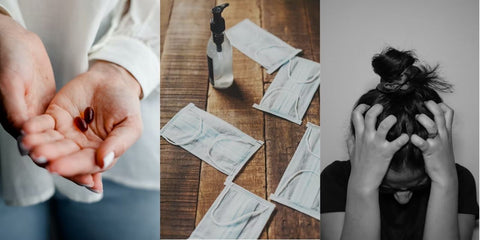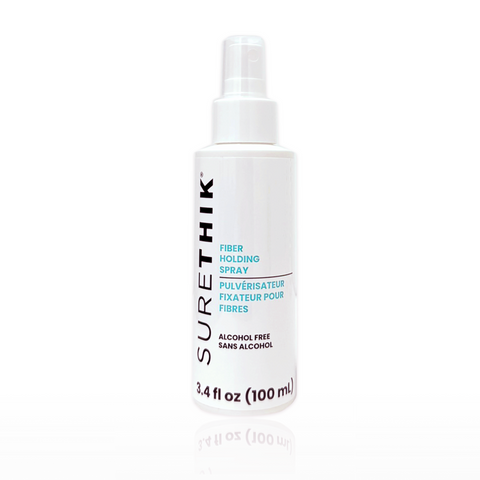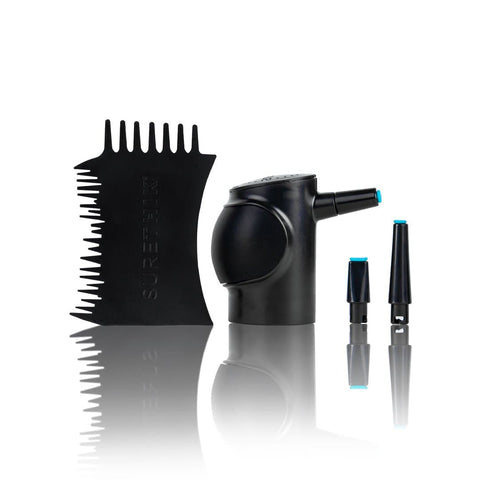
Causes of Hair Loss In Your 20's and 30's
Your scalp has around 100,000 individual hairs. It's very normal to shed between 50 and 100 hairs per day. However, because new hair grows as old hair sheds, you usually don't notice any significant hair loss.
But what if you have premature hair loss? Losing hair in your twenties or thirties may be very upsetting, especially if you don't know why it's occurring. Hair thinning can be an indication of an underlying disease or a combination of disorders, although early hair loss may be curable in some people.
This is a problem that affects both men and women. Some folks are unconcerned by their new appearance. Others, on the other hand, experience feelings such as grief or humiliation as their hair begins to thin. If you're concerned about your hair loss or thinning, your doctor can help you determine the reason of the loss and establish a treatment plan that's suited for you.
WHAT ARE COMMON CAUSES OF EARLY HAIR LOSS?
1.VITAMIN DEFICIENCY:
Your body generates skin, muscle, and bone on a daily basis. It produces rich red blood that transports nutrition and oxygen to far-flung outposts, as well as nerve messages that travel thousands of kilometers through the brain and body. It also creates chemical messengers that transport information from one organ to the next, allowing you to live longer.
Vitamins and minerals are considered vital nutrients because they play hundreds of roles in the body when they work together. They aid in the repair of bones, the healing of wounds, and the strengthening of the immune system. They also repair cellular damage and transform food into energy.
Vitamins are necessary for the formation of the building blocks of a healthy body, which includes hair. Our bodies are unable to produce healthy hair when we are deficient in Nutrient A, B-complex vitamins, biotin, iron, magnesium, calcium, zinc, or any other vitamin. A doctor's examination of your vitamin and mineral levels is the best approach to determine which vitamins you need to supplement in order to reverse hair loss.
2. HORMONES:
Our hair cries out for attention. Changes in the appearance of our hair can elicit a wide range of emotions, pushing us to actively participate in hair cutting, straightening, curling, bleaching, darkening, or other severe chemical treatments. Hair is an important component of our identity and how we display ourselves to others. This is why thinning hair is such a major concern — it can be a very stressful subject for many women because there is no fast fix for growing more hair.
Hair loss is a dreadful and stressful experience that we all must confront as we get older. The scalp becomes so vivid when hair is a tad too oily, and now the hair part has been moved over to a different spot, thereby concealing the thinned out patches next to the temples, as hair thins over the years and the shower drain clogs almost on a daily basis, and the hair part has been moved over to a different spot, thereby concealing the thinned out patches next to the temples.
Women, in particular, have a highly exact hormonal balance, which may be thrown off by stress, pregnancy, or even new drugs. It's very common to see hair loss after pregnancy.
High cortisol levels can cause other hormones to struggle to keep up with high cortisol levels, whether you're a man or a woman. Hair begins to fall out or thin when these hormones become unbalanced. Hair will start to grow back after the hormones are regulated again (a few months after delivering a kid or once the stress is gone).
3. COVID-19 HAIR LOSS:
Fever is a frequent COVID-19 symptom. Many people experience substantial hair loss a few months after having a high fever or recovering from an illness.
Many people mistakenly believe this is hair loss, however it's simply hair shedding. Telogen effluvium is the medical term for this type of hair loss. When a large number of hairs enter the shedding (telogen) phase of the hair growing lifecycle at the same time, this occurs. More hairs may enter the shedding phase as a result of a fever or sickness.
Hair loss is usually visible two to three months following a fever or sickness. When you shower or brush your hair, a few strands of hair may fall out.

WHAT TO DO ABOUT PREMATURE HAIR LOSS:
If you're in your 20s or 30s and suspect you're losing your hair, see your doctor. They'll be able to pinpoint the source of the problem, allowing you to address it as soon as possible.
Hair Building Fibers are without a doubt the #1 option for hair stylists and celebrities when it comes to concealing hair loss in men and women. It's the most natural and safest approach to hide thinning hair, a wide hair parting, crown hair loss, or a receding hairline.
You may disguise thinning spots by rapidly thickening and fullering your current hair with Surethik Hair Fibers. Human hair is made up of hundreds of keratin protein nanoparticles; the more protein in our hair, the thicker it is.
SureThik fibers are a duplicate of those keratin particles that use magnetism to connect to your current hair and rapidly thicken and fills it, resulting in a less visible scalp. Sprinkle SureThik Fibers on thinning spots to thicken and fuller your hair.
CAN YOU PREVENT EARLY HAIR LOSS?
the answer to this questions is unfortunately, Hair loss brought on by hereditary reasons is unavoidable. Hair loss caused by other reasons, on the other hand, may be avoided. Treating your hair gently each time you wash and dry it is the first step in preventing early hair loss. Hair loss in your 20s and 30s may be avoided by avoiding harsh hair treatments and products including hot oil treatments, hot rollers, and chemicals used in permanents.
HAIR CARE:
1. Heat Protectant: Heat protectants provide a barrier between your style tool and your hair, keeping moisture in and frizz at bay. They also act to smooth the cuticle, giving your hair a smooth and silky appearance. Quality heat protectants include humectants (such as panthenol and propylene glycol), which retain moisture and prevent frizz; amino acids (such as keratin), which strengthen hair and give antioxidants; and natural oils and extracts (such as aloe), which protect and seal the hair's cuticle. While some products use silicones (such as dimethicone and cyclomethycaine) and water-based polymers (such as polyquaternium and acrylate copolymer), these components can create a film on particular hair types and end up weighing it down, so some people choose to avoid them.
2. Avoid Washing Your Hair Regularly: Everyone's hair is different, and some individuals have more oil difficulties than others. However, there are a few solid reasons to grab your bottle of dry shampoo every now and again!
Washing your hair on a daily basis might have the consequences:
Depletes your natural oils: True, too much oil isn't always a good thing, but some natural oil is necessary for your hair's health. Over-washing can deplete the hair's natural oils, making it drier and more prone to breaking. SureThik Shampoo for Men and SureThik Shampoo for Women will aid to penetrate deep into the pores, removing any build-up and providing a thorough clean. SureThik Conditioner for Men and SureThik Conditioner for Women nourishes hair and is loaded with revitalizing nutrients and all-natural botanicals to deliver a long-lasting deep moisturizing condition. This treatment is ideal for reviving damaged, weak hair and, with continued use, helps to enhance volume and suppleness.
ESSENTIAL OILS:
Aromatherapy has long been demonstrated to be good to our health and well-being, including reducing the aging process. Thinning hair is frequently linked with aging, however this is not always the case. Androgenetic alopecia, the most prevalent kind of hair loss, can strike males in their early twenties.
One of the first studies on the use of essential oils for hair loss and thinning hair (Archives Dermatology, 1998) discovered that rosemary, thyme, cedarwood, and lavender essential oils encourage hair development. A rising number of research have shown that essential oils have hair-growing qualities. Here are the six greatest essential oils for regrowing hair and preventing hair loss:
Peppermint Oil:
Menthol is included in around 40% of peppermint essential oil. Menthol has been shown in studies to enhance blood circulation in the scalp. Menthol appears to be more effective than minoxidil at increasing the number and depth of hair follicles at an identical concentration.
Thyme Oil:
Inflammation is recognized as a primary contributor to aging and hair loss. According to research, thyme possesses anti-inflammatory qualities that can prevent hair loss and encourage hair growth.
Lemon Oil:
Aids in the revitalization of hair follicles According to a study on the antibacterial activity of various essential oils, lemon oil has anti-oxidative and purifying characteristics, thus it may help cleanse and revitalize hair follicles.
Ylang Ylang Oil:
balances the scalp and the oil has long been used to promote healthy hair growth ylang ylang essential oil, like cedarwood oil, has the potential to balance oil production. A healthy scalp promotes hair development.
Overall, You may always blend essential oils with other hair-growth-promoting substances to achieve the best results.
Menthol, vitamin E, rosemary, cedarwood, thyme, lavender, and lemon essential oils work together to revitalize the scalp and promote hair follicles. Caffeine, niacinamide, menthol, rosemary, thyme, cedarwood, and ylang ylang essential oils are combined in Hair Growth Serum to help decrease hair loss and encourage hair growth.








